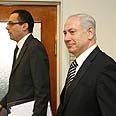
Israeli Prime Minister Benjamin Netanyahu played down sharp differences with the United States over Jewish settlements on Sunday before the arrival of two senior US officials.
"It is only natural, that within a fabric of friendly relations between allies, there isn't full agreement on all points," Netanyahu said.
US President Barack Obama's Middle East envoy, former senator George Mitchell, will try in talks with Israeli leaders to end the most serious rift between Israel and its main ally in a decade.
Mitchell was due to meet Israeli Defense Minister Ehud Barak later in the day, see Palestinian President Mahmoud Abbas on Monday and hold discussions with Netanyahu on Tuesday.
US Defense Secretary Robert Gates also plans talks in Israel. He was due to meet Netanyahu and Barak on Monday to discuss missile defense, Iran's nuclear ambitions and bilateral security issues, a senior US defense official said.
"This relationship is important and steadfast," Netanyahu, who has refused to meet Obama's demand to freeze settlements in the occupied West Bank and Arab east Jerusalem, told his cabinet about US-Israeli ties.
"We are trying to reach understandings on various issues so that we can, together, advance our common goals: peace, security and prosperity for all of the Middle East."
Mitchell and Barak have attempted in a series of meetings over the past several weeks in New York and London to forge a compromise on settlement expansion, an issue at the heart of the Israeli-Palestinian conflict.
Palestinian leaders have said peace talks with Israel, frozen for the past six months, cannot resume unless all settlement activity ceases.
Barak has raised the possibility of halting construction in settlements while allowing building projects already under way to continue, as part of a deal under which Arab countries would take initial steps to normalize relations with Israel.
Netanyahu has pledged not to build new settlements or expropriate additional territory in the West Bank, where Palestinians hope to build a state.
But he has said construction in settlements to accommodate the "natural growth" of their populations must continue. Palestinians say they fear settlements, deemed illegal by the World Court, could deny them a viable and contiguous state.
In another sign of tensions between Netanyahu's right-leaning government and the Obama administration, the Israeli leader has also rejected US pressure to halt the planned construction of 20 new homes for Jews in east Jerusalem.
Israel captured east Jerusalem, where 200,000 Israelis and 270,000 Palestinians now live, in a 1967 war and annexed it in a move that has not won international recognition. Palestinians want east Jerusalem to be the capital of a future Palestine.
Netanyahu also said Sunday that ministers and deputy minister who will fail to attend the vote on the Mofaz bill and the land privatization bill, will face dismissal from the government.
The Mofaz bill stipulates that splinter groups can leave Knesset factions, and receive funding, if they constitute one-third or seven Knesset members of the faction.















